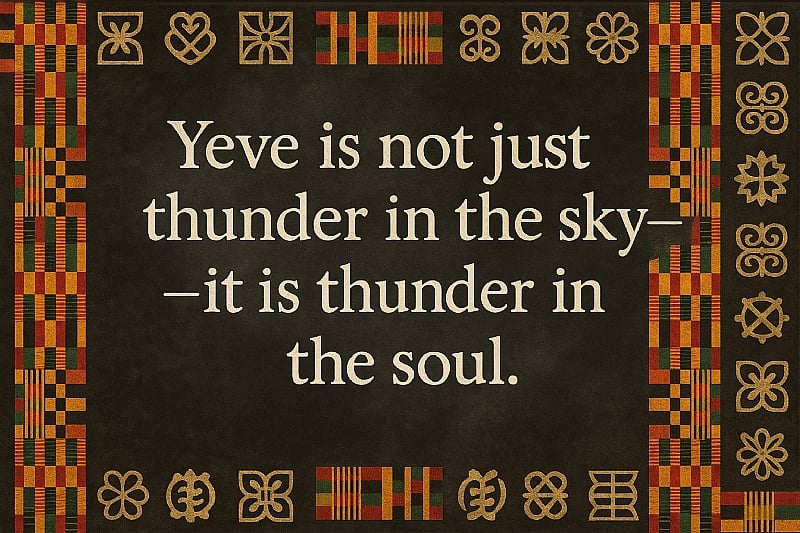⚡ Echoes of Eweland: The Divine Symphony of Thunder and Spirit
The Ewe people, rooted in southeastern Ghana and stretching across the Volta River basin into Togo and Benin, carry with them a cultural heritage that resounds with ancestral wisdom, ritual harmony, and celestial reverence. Their origins whisper through migration tales from Ketu, where spiritual resilience triumphed over tyranny, forging pathways of survival and sanctity.
At the heart of Ewe spirituality lies Vodun, a complex cosmology of spirits, elements, and divine intermediaries. It is not merely religion—it is a lived philosophy woven through daily rhythms, moral codes, and ancestral memory.
Presiding over their cosmic hierarchy is Mawu, the supreme goddess of creation, compassion, and lunar grace. Her counterpart Lisa, radiant and resolute as the sun, balances this divine equation—where harmony between feminine intuition and masculine vigor births order in the universe.
Among the pantheon, Yeweh stands electrified—a deity of thunder and lightning, justice and moral rectitude. Yeweh’s domain is swift, unyielding, and deeply sacred. Followers undergo rigorous rites of initiation, adopting spiritually coded names that embody personal rebirth and divine allegiance. Sacred music, rhythmic drumming, and communal dance elevate worship into an artform—where thunder speaks not in rage but in truth.
Other deities animate the spiritual constellation:
Se, invoked for atmospheric protection. Heviosso, kindled in fire and warfare. Afa, the astral diviner who charts destiny in symbols.
The Ewe view their faith not as doctrine but as devotion. Ancestral spirits live on through ritual, song, and storytelling. Festivals aren’t merely celebrations—they are remembrances. Masks become moral metaphors. Dances become historical documents. Every bolt of thunder is not just weather—it is witness.
Despite modern currents and spiritual conversions, traditional Ewe beliefs echo strongly, influencing governance, community ethics, and personal identity. Their cosmology offers more than myth—it offers meaning.
⚡ Yeve: The Sacred Pulse of Thunder in Ewe Life and Tradition
Among the Ewe people of Ghana, Togo, and Benin, Yeve (also spelled Yeweh or Yeʋe) is not merely a deity—it is a spiritual institution, a moral compass, and a cultural heartbeat. Revered as the god of thunder, lightning, and fire, Yeve embodies justice, discipline, and cosmic authority.
🔥 Divine Identity and Symbolism
Yeve is believed to descend from the heavens as a stone or thunderbolt, often after a storm—marking divine presence. His essence is fiery and electric, symbolizing purification, truth, and instant justice. Yeve is closely linked to other West African thunder deities like Shango (Yoruba) and Xevioso (Fon), reflecting a shared cosmological thread across cultures.
🌀 The Yeve Fraternity and Initiation
Yeve worship is organized through an exclusive spiritual fraternity, with initiates undergoing seclusion, moral training, and ritual rebirth. Priests (Midawos) and priestesses (Minawos) guide initiates through sacred teachings on ethics, discipline, and societal values. Upon initiation, followers receive Yeve names—spiritually coded titles that reflect divine attributes and personal transformation. Examples include: Agbodzihu – “Mystery of the gatekeeper” Sowubo – “Yeve is more powerful than charms” Dafliso – “The serpent has plugged thunder”
🎶 Music, Dance, and Ritual Performance
Yeve music is among the most sophisticated sacred traditions in Eweland, featuring seven to nine distinct dance movements. Each phase of worship is marked by drumming suites, chants, and symbolic gestures that invoke Yeve’s power. Rituals are performed in shrines and sacred groves, often during festivals or communal rites of passage.
🌿 Cultural Integration and Ethical Legacy
Yeve worship instills high moral standards, with followers known for integrity and spiritual discipline. Historically, Yeve’s influence shaped education, justice, and community ethics, earning respect even from colonial observers. Despite modern pressures from Christianity and Western education, Yeve traditions persist—especially in southern Volta communities—as symbols of cultural pride and spiritual resilience.
🧭 Yeve in Ewe Cosmology
Yeve is part of a broader spiritual constellation that includes:
Mawu and Lisa – Supreme creators representing moon and sun. Se – Another thunder deity, invoked for protection. Afa – God of divination and astral guidance. These deities form a moral and metaphysical framework, guiding Ewe life through balance, justice, and ancestral wisdom.
Retired Senior Citizen
Teshie-Nungua
[email protected]


